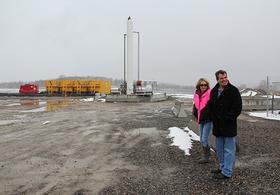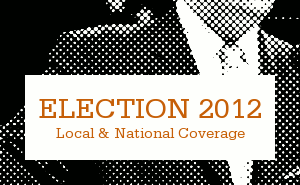
Amy Pare is a plastic surgeon in Washington County. She makes her living doing lifts, tucks and augmentations. So it’s remarkable that she finds herself in the middle of a public health debate. It started about two years ago, she says.
That’s when patients started coming in with what looked like acne on their faces.
“We started to have patients that would have open areas or recalcitrant lesions, that just kind of bled, ulcerated, didn’t quite heal.”
Pare’s first concern was skin cancer. So she took biopsies. They came back negative for cancer. But they weren’t normal either, so she ordered urine tests.
The patients also had headaches and were acting lethargic.
“We thought, ‘Well, are these patients exposed to anything?’ So then we would ask the patients are they exposed to anything at home or at work?”
Many of the patients lived near newly drilled gas wells. Pare asked her patients to take urine tests. They found methane, toluene, and hippuric acid, chemicals and compounds that could have come from exposure to natural gas drilling.
Doctors like Pare are scrambling to figure out how to treat patients like these—and determine if there is indeed a link to drilling.
The Pennsylvania Medical Society represents 18,000 doctors in the state. The group thinks fracking could have public health impacts. But its members admit, the scientific evidence of these impacts is pretty thin.
“There’s a lot we don’t know, and a lot we need to learn about exactly what they are,” says Ralph Schmeltz, a University of Pittsburgh endocrinologist and past president of the Pennsylvania Medical Society.
The industry says fracking is safe and points to government reports in Texas and Pennsylvania that find no evidence of groundwater pollution.
On the other hand, a growing number of case studies have documented people near gas wells getting sick. But these studies are hardly definitive, says Jean Finkel, an epidemiologist at Weill Cornell Medical College in New York.
Finkel says we simply dont know what causes many of these reported problems. A headache could come from toxic fumes, but it could just as easily come from stress. Finkel says to answer the question, scientists need long term studies.
“We have to look at biological plausibility—is the disease biologically plausible based on the compounds in drilling process—and how strong is the association between exposure to risk and development of disease?”
Many are calling for the creation of a health registry for Marcellus shale that would list people who say they’ve gotten sick from fracking. It would be used as a basis for future health risk studies.
Last year State lawmakers earmarked $2 million from the proposed Marcellus Shale impact fee to fund a registry. However, that money was stripped out of the bill before a final vote.
Even without impact fee funding, several shale-related health projects have sprouted in recent months.
One of these is the Southwestern Pennsylvania Environmental Health Project.
Raina Rippel runs the center in McMurray, Washington County. It’s funded by philanthropies, including the Heinz Endowments, which also supports the operation of Essential Public Radio.
It’s the first medical outreach program specifically designed to treat people near gas wells. Rippel says her team will compile patient information for scientists to study, but the project’s primary function is to get help to those who are sick.
“We’re going to the people who we believe have probably been impacted,” says Rippel. “Are these people near a drilling site, or gas drilling activities? And are they experiencing significant health concerns? And we want to provide them with a response.”
Among its first clients is June Chappel. She leased her Hopewell Township land for drilling to Range Resources.
Chappel says a frack pond built by Range behind her house produced intense odors. Water in these ponds can contain chemicals used to break up the shale, plus heavy metals and salts from underground.
“It smelled like you were sitting inside your car with a gas can,” Chappel says.
At the time, Chappel’s husband, Dave, was suffering from terminal cancer. He began to develop nosebleeds. She thought they were from his chemotherapy. Then she started getting nosebleeds too. Then, a ringing in her ears. She says it feels like she’s been to a loud concert the day before, “only this just never stops.”
Chappel complained to Range Resources and it removed the frack pond. Range spokesman Matt Pitzarella says the company probably shouldn’t have put the impoundment so close to Chappel’s house.
However, he says any odors were probably due to bacteria, not pollution. And he disputed the claim that the wells could have made Chappel sick. Pitzarella cited an MIT study which found only 43 problem cases out of a total of 20,000 shale gas wells drilled over the last 10 years.
Chappel is still worried about the long-term impact of her exposure.
Doctor Sean Porbin sees more benefit than risk from fracking. He has a small practice in Avella. The town is surrounded by wells.
“I’ve been looking for the past three years and I haven’t seen a thing. I think the big story here is, so far is, with all the hype, there is no story,” Porbin says.
Porbin himself has leased gas rights to his property. He sees the gas rush as a boon to the old coal town. And he wonders if health complaints aren’t driven by a profit motive. Still, he says, he’ll keep his eyes open and he’s signed on to work with the newly opened environmental health center.
“The potential here is that everyone is supposed to win,” he says. “The farmer’s getting the royalties, the Subway shops that are full at lunch— the little gas station. Everyone’s winning here. And noone wants to see anyone get sick. You got to watch it, though. And we are.”
Among those who count themselves as winners are Kathy and Guy Avolio. Chesapeake drilled a well on their property three years ago. It sits on a large pad behind their home. The couple live on a 600-acre farm in Avella with a koi pond and chicken coop. Kathy Avolio says her three kids have a nickname for the well: ‘College.’
Guy Avolio is an urgent care physician. He’s heard and read reports of water contamination from fracking. But he’s convinced that drilling is the right thing to do and so does his wife.
“I would never put my kids — no matter what pricetag you put on it—would I ever put my kids in harm’s way,” says Kathy Avolio. “But I also feel like my husband does—we have to try, to get this. I mean, this is an incredible technology.”
The Avolios grew up near Pittsburgh, and remember when the mills were booming. The memory colors how they think about the current gas boom.
“My dad was a steelworker in Aliquippa. He always says, ‘You know, the cars were dirty, the streets were dirty, but at least everybody had a job.’”
In their backyard and in their town, the Avolios see economic prosperity. And their family is healthy. For the Avolios, the benefits of shale outweigh the risks, whatever they may be.






